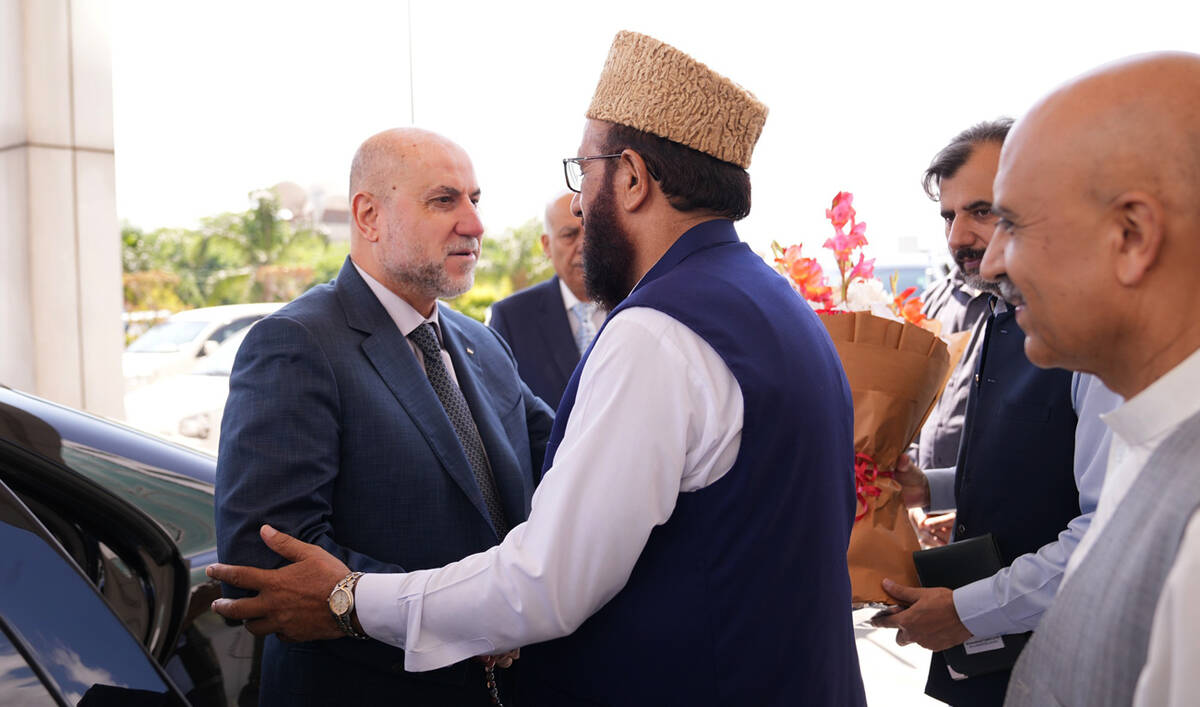ISLAMABAD: A senior Palestinian official visiting Pakistan on Thursday condemned the United States for refusing visas to President Mahmoud Abbas and his delegation for this monthтАЩs UN General Assembly session and a parallel conference on reviving the two-state solution.
Dr. Mahmoud Al-Habbash, Chief Islamic Justice of Palestine and adviser to Abbas on religious affairs, is in Islamabad with a four-member delegation to attend celebrations of the 1,500th birth anniversary of Prophet Muhammad (PBUH).
Washington said last week it would not allow Palestinian Authority President Mahmoud Abbas and others to travel to New York, where several US allies are set to recognize Palestine as a state.
Al-Habbash told Arab News the US decision was an тАЬunjust, dangerous, and wrongтАЭ violation of international law.
тАЬThis is a major mistake and will complicate matters, but this will not stop us from continuing our struggle or from raising our voice,тАЭ Al-Habbash said.
тАЬThe voice of Palestine will be heard, through President Mahmoud Abbas, by the whole world, whether at the international conference on Sept. 22 or at the General Assembly.тАЭ

Pakistan Religious Affairs Minister Sardar Muhammad Yousaf welcome Dr. Mahmoud Al-Habbash, Chief Islamic Justice of Palestine and adviser to Abbas on religious affairs, at the Ministry of Religious Affairs in Islamabad on September 5, 2025. (Handout/MoRA)
The United States, as host of the UN in New York, is obligated under its agreement with the world body not to block access for accredited delegations.
The visa refusal also means the Palestinians will miss a high-level meeting on Palestine co-hosted by France and ┬▄└Ґ╩╙╞╡.
The US move comes amid growing momentum in Europe to recognize a Palestinian state after the latest Gaza war, which began on Oct. 7, 2023, and has killed more than 63,000 Palestinians according to Gaza health authorities. In May, Ireland, Spain and Norway announced recognition of Palestine, joining over 140 countries worldwide that already extend diplomatic recognition. France has said it is ready to do the same in coordination with EU partners, while Britain has signaled openness.
By contrast, Washington has stood firmly behind Israel, continuing military aid and diplomatic cover despite the mounting death toll in Gaza and expanding Israeli settlement activity in the West Bank. US officials have said they will not recognize Palestine outside of direct negotiations with Israel, a stance Palestinians view as blocking their international legitimacy.
Meanwhile, IsraelтАЩs far-right government has openly advanced plans to permanently occupy Gaza while simultaneously moving to entrench control over the occupied West Bank. Senior ministers have called for re-establishing Israeli settlements in Gaza, dismantled in 2005, and for formally annexing key areas of the West Bank such as the Jordan Valley and major settlement blocs including MaтАЩale Adumim, Ariel and Gush Etzion. The steps have been widely condemned as violations of international law and seen as undermining any prospect of a two-state solution.
On IsraelтАЩs plans to annex parts of the occupied West Bank, Al-Habbash said:
┬атАЬThis is an illegal action. It contradicts international law and legitimate international resolutions. It will have no legal or political validity.тАЭ
He added that Palestine would тАЬcontinue to exist between the river and the sea,тАЭ while the тАЬone who will disappear is the Israeli occupation.тАЭ
Al-Habbash also praised Pakistan as a тАЬcountry of brave people,тАЭ describing Pakistanis as тАЬour brothers who always stand by us.тАЭ He said his delegation would deliver a message from Abbas to President Asif Ali Zardari and Prime Minister Shehbaz Sharif on bilateral ties and the Palestinian cause.
The Palestinian delegation is scheduled to take part in the Seerat-un-Nabi conference in Islamabad, where Al-Habbash said he felt тАЬthe warmth of the hospitalityтАЭ of Pakistan.

















